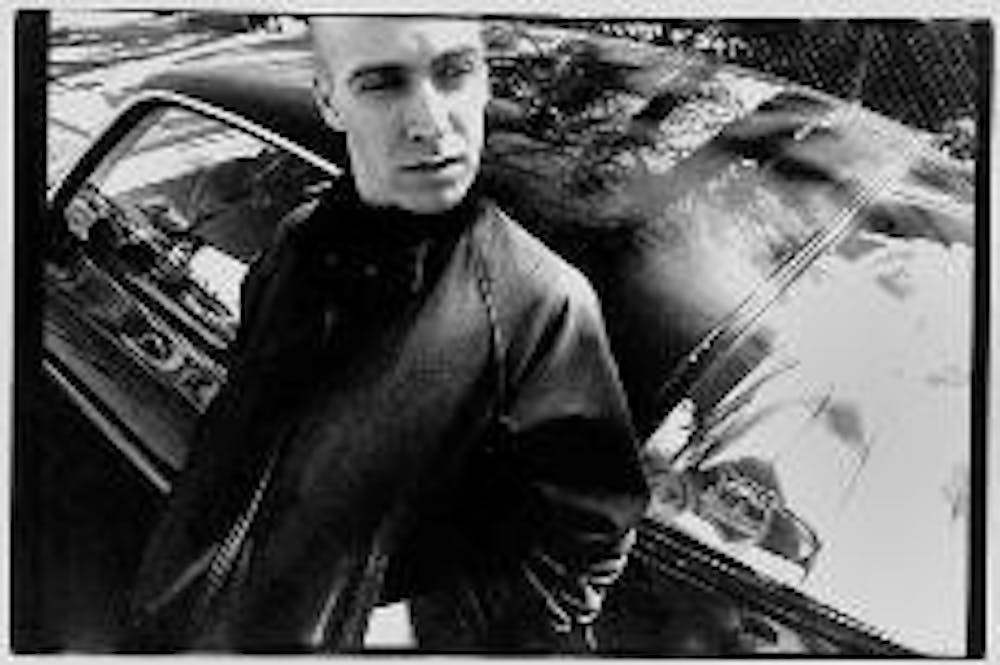In the small, intimate backstage area of the Black Cat, it's hard to escape Joe Lally's steady gaze, especially as one of only 40 people that braved the icy streets on Monday night to see what he's been up to since Fugazi went on indefinite "hiatus."
Despite the night's relatively poor turnout, Lally's October 2006 solo effort, "There to Here," is earning him much-deserved respect and attention, though he is still better known as Fugazi's bassist.
"I think it's inevitable. There has to be a reference point; people don't just come out of nowhere and start making music," Lally said of stepping out of the seminal band's shadow. He added:
"I think when people see [me] it won't matter as much to them anymore. It doesn't really bother me; I was in Fugazi for 16 years. I don't find it degrading at all."
The show, one of three remaining dates on a tour of the northeast United States, opened with Capillary Action. The Philadelphia quartet's brief 30-minute set sounded as if a bomb exploded in a record store, mixing the neatly divided jazz, metal, ska and punk sections into one surprisingly hot, enjoyable mess. Its spontaneity and free-jazz melodies played perfectly off Lally's style.
Lally's music is nothing short of hypnotic. His bass line is beautifully fluid. Both his set and album are incendiary but in a much less forced manner than the sonic barrage of Fugazi. With honest vocals both seething and soothing, his probing lyrics are an impressive, poetic study of the duality of the human condition. Desire for both individualism and greater interconnectivity are juxtaposed with the ironies they inevitably produce. Lally's brand of confident blues questions the status quo.
"I see the bass as making the foundation that things can be moving on. In Fugazi I felt like I was holding a certain thing in place," Lally said of his style.
"A couple of my Italian friends were comparing the bass to pasta, which in Italian also means pizza dough. So, the bass is the pasta and people coming in are for adding flavors to make it taste more interesting, and the drummer said that the drums are the fire cooking it," he said.
Lally is well-acquainted with Italy. While playing there he met his wife, and in February he will begin touring Europe with Italian indie band Zu. Befitting his travel-heavy lifestyle, Lally's music is without restrictions. Thriving on adaptable constructs, it is embellished upon by the wide range of musicians who have accompanied him on stage in other countries, like Brazil, where he has been able to connect with audiences despite a language barrier.
"People were very excited that I wasn't trying to be Fugazi-like. I think they would have been let down if I did. I was worried about them, not speaking the language, not understanding the lyrics," Lally said of foreign audiences.
"The music's very lyrical and I didn't know whether it would go over well," he said. "But it was great, because after the show people came up to me and said that it felt like someone was talking to them."
Having experienced Lally's show, it is easy to understand what they mean. Reassured by Lally's consistent eye contact with the crowd, one understands that he or she is experiencing something individual and unique, far from a routine set, as each show is intended to be a different. For the Black Cat show, Lally and Capillary Action launched into freshly written and minimally practiced "Skin and Bone," the standout of the night and true testament to the musicians' skill. Other highlights, both on and off Lally's record, included "Pick a War," "Factory Warranty" and "There to Here."
This approach to music is perplexing; unlike many acts that pride themselves on the ability to mirror record-perfect sound, Lally is more interested in playing than planning.
"I was constructing music that I could take anywhere," Lally said. "It's supposed to constantly change. It's cyclical and unstructured so different [musicians] can add to different parts of the wheel without much practice. What I'm doing is telling people what not to do. That way they can do different things; they just have to keep to the theme or mood. I hope the songs change into an unrecognizable form from what's on the record"





